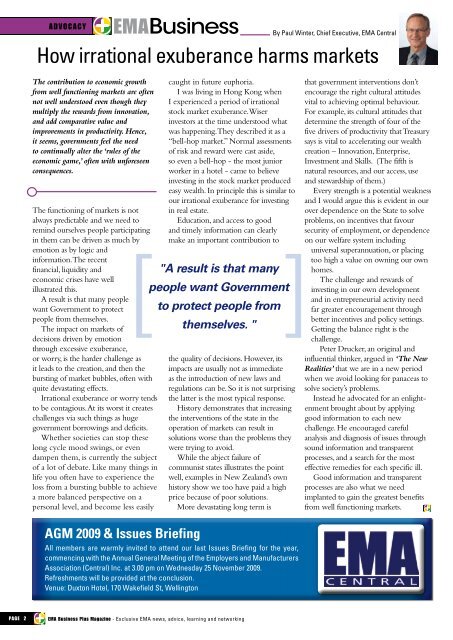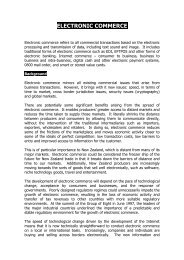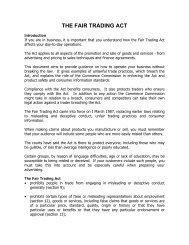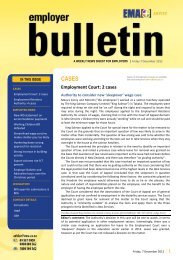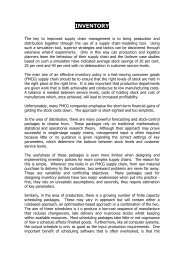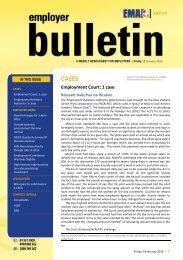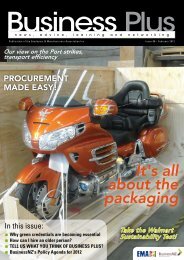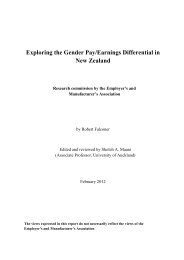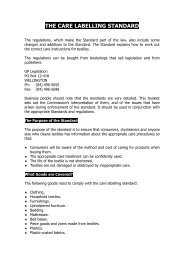Tailored - EMA
Tailored - EMA
Tailored - EMA
Create successful ePaper yourself
Turn your PDF publications into a flip-book with our unique Google optimized e-Paper software.
<strong>EMA</strong>Business<br />
How irrational exuberance harms markets<br />
By Paul Winter, Chief Executive, <strong>EMA</strong> Central<br />
The contribution to economic growth<br />
from well functioning markets are often<br />
not well understood even though they<br />
multiply the rewards from innovation,<br />
and add comparative value and<br />
improvements in productivity. Hence,<br />
it seems, governments feel the need<br />
to continually alter the ‘rules of the<br />
economic game,’ often with unforeseen<br />
consequences.<br />
The functioning of markets is not<br />
always predictable and we need to<br />
remind ourselves people participating<br />
in them can be driven as much by<br />
emotion as by logic and<br />
information. The recent<br />
financial, liquidity and<br />
economic crises have well<br />
illustrated this.<br />
A result is that many people<br />
want Government to protect<br />
people from themselves.<br />
The impact on markets of<br />
decisions driven by emotion<br />
through excessive exuberance,<br />
or worry, is the harder challenge as<br />
it leads to the creation, and then the<br />
bursting of market bubbles, often with<br />
quite devastating effects.<br />
Irrational exuberance or worry tends<br />
to be contagious. At its worst it creates<br />
challenges via such things as huge<br />
government borrowings and deficits.<br />
Whether societies can stop these<br />
long cycle mood swings, or even<br />
dampen them, is currently the subject<br />
of a lot of debate. Like many things in<br />
life you often have to experience the<br />
loss from a bursting bubble to achieve<br />
a more balanced perspective on a<br />
personal level, and become less easily<br />
caught in future euphoria.<br />
I was living in Hong Kong when<br />
I experienced a period of irrational<br />
stock market exuberance. Wiser<br />
investors at the time understood what<br />
was happening. They described it as a<br />
“bell-hop market.” Normal assessments<br />
of risk and reward were cast aside,<br />
so even a bell-hop - the most junior<br />
worker in a hotel - came to believe<br />
investing in the stock market produced<br />
easy wealth. In principle this is similar to<br />
our irrational exuberance for investing<br />
in real estate.<br />
Education, and access to good<br />
and timely information can clearly<br />
make an important contribution to<br />
"A result is that many<br />
people want Government<br />
to protect people from<br />
themselves. "<br />
the quality of decisions. However, its<br />
impacts are usually not as immediate<br />
as the introduction of new laws and<br />
regulations can be. So it is not surprising<br />
the latter is the most typical response.<br />
History demonstrates that increasing<br />
the interventions of the state in the<br />
operation of markets can result in<br />
solutions worse than the problems they<br />
were trying to avoid.<br />
While the abject failure of<br />
communist states illustrates the point<br />
well, examples in New Zealand’s own<br />
history show we too have paid a high<br />
price because of poor solutions.<br />
More devastating long term is<br />
that government interventions don’t<br />
encourage the right cultural attitudes<br />
vital to achieving optimal behaviour.<br />
For example, its cultural attitudes that<br />
determine the strength of four of the<br />
five drivers of productivity that Treasury<br />
says is vital to accelerating our wealth<br />
creation – Innovation, Enterprise,<br />
Investment and Skills. (The fifth is<br />
natural resources, and our access, use<br />
and stewardship of them.)<br />
Every strength is a potential weakness<br />
and I would argue this is evident in our<br />
over dependence on the State to solve<br />
problems, on incentives that favour<br />
security of employment, or dependence<br />
on our welfare system including<br />
universal superannuation, or placing<br />
too high a value on owning our own<br />
homes.<br />
The challenge and rewards of<br />
investing in our own development<br />
and in entrepreneurial activity need<br />
far greater encouragement through<br />
better incentives and policy settings.<br />
Getting the balance right is the<br />
challenge.<br />
Peter Drucker, an original and<br />
influential thinker, argued in ‘The New<br />
Realities’ that we are in a new period<br />
when we avoid looking for panaceas to<br />
solve society’s problems.<br />
Instead he advocated for an enlightenment<br />
brought about by applying<br />
good information to each new<br />
challenge. He encouraged careful<br />
analysis and diagnosis of issues through<br />
sound information and transparent<br />
processes, and a search for the most<br />
effective remedies for each specific ill.<br />
Good information and transparent<br />
processes are also what we need<br />
implanted to gain the greatest benefits<br />
from well functioning markets.<br />
AGM 2009 & Issues Briefing<br />
All members are warmly invited to attend our last Issues Briefing for the year,<br />
commencing with the Annual General Meeting of the Employers and Manufacturers<br />
Association (Central) Inc. at 3.00 pm on Wednesday 25 November 2009.<br />
Refreshments will be provided at the conclusion.<br />
Venue: Duxton Hotel, 170 Wakefield St, Wellington<br />
PAGE 2<br />
<strong>EMA</strong> Business Plus Magazine - Exclusive <strong>EMA</strong> news, advice, learning and networking


